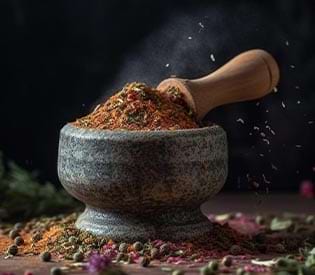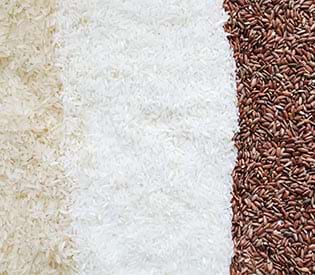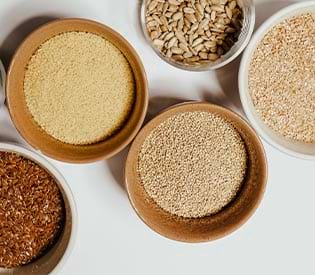Mugwort Herb
📦🚚 Fast & Free shipping on all orders
What is mugwort herb?
Mugwort is a hardy annual plant that usually grows in the warmer parts of the Northern Hemisphere. It lives in Europe, Asia, and North Africa, where it was born. There are many different kinds of plants in the genus Artemisia that are called "mugwort," but unless otherwise stated, this piece is only about the mugwort plant Artemisia vulgaris. Most people consider mugwort to be an unwanted weed. Mugwort grows quickly and easily, often taking over large areas of a yard. It has a connection to ragweed, and allergic reactions to it can be similar to those that ragweed causes. Because of this, most people kill it or get rid of it.
Many old beliefs about this plant are based on myths. People used to believe that mugwort could protect them from fatigue, sunstroke, injury from wild animals, and harm from evil spirits. People also say that the Romans put mugwort in their shoes to make their feet feel better. By putting mugwort leaves in hot water, people can make tea from them. Some people also use the plant instead of tobacco to smoke. It can also be bought in capsules at many health food shops.
How do I use mugwort herbs?
Food. Asian cuisine utilizes mugwort as a culinary herb, in addition to its potential medicinal properties. The herb is aromatic and astringent in nature, while the root is fragrant and pungent. Mugwort, also referred to as "ssuk," complements oily meat, poultry, and fish, and some claim it aids in digestion.
Mugwort herb benefits:
Mugwort has been used as medicine in different parts of the world for a long time. People today advise taking mugwort orally to treat stomach problems, menstrual problems, and high blood pressure. It is also sold as a sleep aid, a stool softener, and a liver booster.
◉ May Improve Digestion: Mugwort might be able to help with some stomach problems. When taken orally, mugwort can, according to some studies, help the bile glands and digestive system relax. The relaxation makes it possible for the body to make more bile, which helps break down food and move it through the digestive system. Researchers have also found that the smell and bitter taste of mugwort may help the body make more bile and other digestive juices, like stomach acid. These can help break food down and make it easier to swallow. However, further research is necessary before using mugwort as a stomach aid. Before taking mugwort by mouth, you should talk to a doctor or nurse.
◉ May Offer Itch Relief: Some studies have indicated that mugwort can stop itching, especially where there are scars. However, the majority of studies have solely examined the role of mugwort in relieving itching when combined with other substances. A small pilot study administered a lotion containing mugwort and menthol to individuals with raised burn scars. The cream effectively alleviated the itching.
◉ Mugwort May Provide Antioxidant Effects: Some studies indicate that mugwort can help combat free radicals. Antioxidants shield the body's cells from free radical damage. The body produces free radicals, which are unstable particles, when it converts food into energy or during physical activity. The number of free radicals in the body can go up from things like smoking, being in dirty air, or being in the sun. Free radicals are the cause of oxidative stress, which can result in inflammation, diabetes, heart disease, and even cancer. By eating antioxidants, you can protect yourself from the damage that free radicals do.
◉ May Help With Irregular or Painful Periods: Some people use mugwort to treat their periods when they don't come on time. This is because mugwort may cause menstruation. Researchers have found that the leaves, flowers, stems, and seeds of mugwort have been used in plant treatments from different cultures to treat both painful and unpredictable periods. People in India, Italy, and Vietnam have used mugwort leaves, flowers, stems, and seeds for various treatments related to menstruation.
Where can I buy mugwort near me?
Buy mugwort herb from the health food store in the USA, Alive Herbals.
Mugwort herb information (at a glance):
| Product Name | Mugwort Herb. |
| Scientific Name | Artemisia vulgaris. |
| Country of Origin | It is native to Europe and eastern Asia. |
| Ingredient | Mugwort herb. |
| Taste & Aroma | It has a mildly bitter taste also an extremely sour taste and a strong aroma. |
| Shelf Life & Storage | Shelf life is about 6–36 months. Store it in an airtight container in a cool, dry place and prevent sunlight exposure. |
| Precautions | We requested you, Before consuming spices, herbs, teas or any kind of natural products you consult an expert qualified healthcare practitioner or herbalist. |
| Note | This product information has not been appraised by the Food and Drug Administration (FDA). For educational purposes only. |







